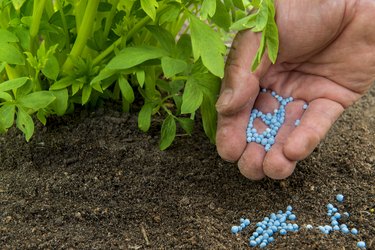
Every spring, humans eagerly shed their winter weather gear and happily step out into their lawns and gardens to begin the work of beautifying the landscape. Many invariably stumble across open bags and bottles of fertilizer and wonder if they are still usable or if they have expired. The answer depends on the type of fertilizer in question. Dry fertilizers last indefinitely unless they contain an insecticide or herbicide, in which case they typically last a mere four years. Liquid fertilizers are viable for up to 10 years.
Dry Fertilizer
Video of the Day
Fertilizers exist to correct soil deficiencies, providing plants with important nutrients that are lacking in their natural environment. The most common nutrients are nitrogen (N), phosphorous (P) and potassium (K). The amount of each chemical gets listed on the bag as a series of numbers that represent the N-P-K ratio. A fertilizer labeled 5-10-5, for example, is 5 percent nitrogen, 10 percent phosphorous and 5 percent potassium. These elements are all stable and do not degrade over time. As a result, granular fertilizers that contain them never lose their potency or expire. Pesticides and herbicides, however, do expire with a typical shelf life of four years. Granular fertilizers that include some sort of insect or weed control component, such as weed and feed varieties, therefore expire in four years.
Video of the Day
Liquid Fertilizer
If dry fertilizer doesn't expire, you may wonder why anyone uses liquid fertilizer at all. Liquid fertilizer benefits plants more quickly than dry fertilizer. Dry fertilizer is first absorbed into the soil and then extracted from the soil by the plant's roots. Liquid fertilizer penetrates the soil much more quickly. It's also absorbed by the plant's leaves as well as its roots, allowing for faster absorption. The trade-off for this speedy effect is a shorter shelf life. Liquid fertilizers generally have a shelf life of eight to 10 years, but they do expire, unlike their dry counterparts. When using older liquids, shake the fertilizer well before use to mix back in any solids that have settled to the bottom of the container.
The Right Fertilizer
You may choose the type of fertilizer you use based on what you already have in your shed. Ideally, however, the determining factors are application technique and absorption rate. Dry fertilizers are either applied mechanically with a broadcast spreader or scattered by hand over small areas. You must irrigate the area after applying the fertilizer. Liquid fertilizers come in handheld spray bottles or containers that attach to the end of a garden hose, allowing for irrigation and fertilization in one step.
The fertilizer absorption rate also determines whether you ought to use dry or liquid fertilizer. Nearly all dry fertilizers take between 24 to 72 hours to penetrate the soil. Liquid fertilizers have a faster absorption rate of less than 24 hours. To determine the best choice, consider the type of plant you are fertilizing and at what point in the growing season you are feeding it. Dormant plants do well with dry fertilizer while actively flowering or fruiting plants will benefit from a fast-acting liquid fertilizer.